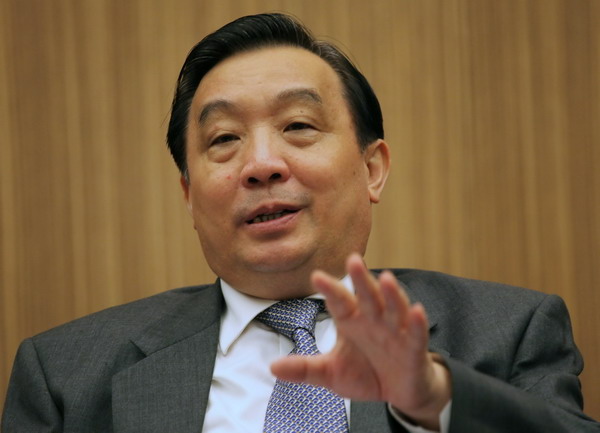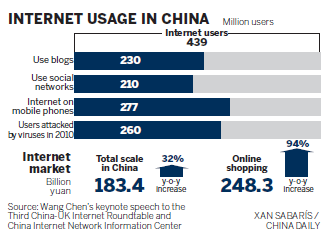Government and Policy
China prepared to defend administration of Net
By Zhang Haizhou and Zhang Chunyan (China Daily)
Updated: 2010-11-23 07:43
 |
Large Medium Small |
|
 Wang Chen is minister of the State Council Information Office. [Xu Jingxing/China Daily]
|
LONDON - China will promote the opening up of cyberspace and welcome foreign firms as long as they abide by Chinese laws and respect traditional Chinese culture, said State Council Information Office Minister Wang Chen on Monday.
On the sidelines of the Third China-UK Internet Roundtable, Wang told China Daily that Beijing is not afraid of the "mud" being thrown at China for its Internet administration.
"We will do our best to explain," Wang said.
Wang's remarks come as Beijing faces mounting international accusations over its Internet administration and alleged hacker attacks. He said the government would strengthen Internet administration through law.

"It's a common understanding that the Internet needs administration and governance," Wang said in his keynote speech to the roundtable, noting China is the "biggest victim of computer hacking".
Nearly 60 percent of Chinese Internet users, he said, were attacked by Trojan horse viruses or hackers in the first half of 2010. The country has about 439 million Internet users, or 39 percent of its population, according to the China Internet Network Information Center.
"International society should fully understand and respect each country's situation and different considerations of online security, and regard each country's Internet development and administration with an objective, tolerant and realistic attitude," he said.
Only a few days ago, a US Congressional advisory group released a document alleging China Telecom diverted data from US military websites through its servers for 18 minutes on April 8.
In March, Google withdrew from Beijing, redirecting traffic to its service in Hong Kong. The move followed what the US-based Internet search engine claimed were Chinese hacker attacks, and its subsequent refusal to filter its search results as required by Chinese law.
In general, Wang told China Daily the Internet is "an engine of China's economic development" and welcomed foreign investment in its cyberspace.
"The fact shows that foreign Internet companies have a bright future in China - as long as they abide by Chinese laws and respect traditional Chinese culture."
China now has about 230 million bloggers and 277 million people surf the Internet on mobile phones, Wang said.
The scale of China's Internet market has reached 183 billion yuan ($27 billion), a year-on-year increase of nearly 32 percent, Wang said, adding that transaction volume of e-commerce has reached more than 3.6 trillion yuan.
Wang said he is a fan of online shopping, and found it's more convenient and cheaper to buy books and music albums online.
Collaboration and win-win
The annual roundtable, themed "collaboration and win-win" this year, was co-hosted by the Information Office and the UK Department for Business, Innovation and Skills.
Wang's debut on Monday made him the highest-level Chinese official to attend the annual dialogue between China and the United Kingdom.
The roundtable opened about two weeks after China and the United States pledged at their fourth annual Internet Forum to increase collaboration to combat cyber crime and protect Internet security.
Nearly 100 representatives, about half from each country, attended Monday's roundtable. Most are high-ranking figures of portal websites, officials and e-business leaders.
"The UK places great value on its relationship with China in the communication sector," said Ed Vaizey, a British parliamentary under-secretary of state for culture, communication and creative industries.
"Its purpose is to highlight the influence of UK companies in the global IT market to show how our companies are increasing their profiles in China and to illustrate how UK intellectual property and know-how can create opportunities for Chinese companies," he said.